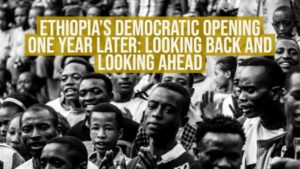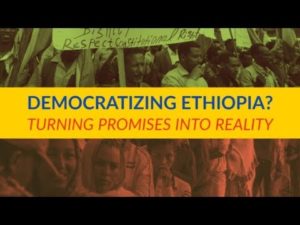Ethnic tensions and state violence – Ethiopia’s democratic transition is in peril https://t.co/3n2pYfN2u3
— Democracy Digest (@demdigest) September 17, 2020
“Freedom is not a gift doled out to people by a government,” Abiy Ahmed said in his inaugural address as Ethiopia’s prime minister in 2018. “Rather [it is] a gift of nature to everyone that emanates from our human dignity.” His words marked a remarkable turn for a country that over the past five decades had seen an absolute monarchy, revolutions, civil war and authoritarian rule, but not freedom or democracy, The Economist reports.
International Crisis Group President Rob Malley and Board Member Naz Modirzadeh, a Harvard professor of international law and armed conflict, join Crisis Group’s Senior Analyst for Ethiopia, Will Davison, to discuss the challenges facing Ethiopia.
 A decision by the United States to suspend a portion of its aid to Ethiopia over issues related to its Grand Renaissance Dam (GERD) may further complicate talks scheduled to resume in mid-September, adds Democracy International.
A decision by the United States to suspend a portion of its aid to Ethiopia over issues related to its Grand Renaissance Dam (GERD) may further complicate talks scheduled to resume in mid-September, adds Democracy International.
In an opinion piece published online by The Economist this week (see article), the prime minister warns that Ethiopia’s journey to democracy risks being derailed by those “who are accustomed to undue past privileges” and those trying “to assume power through violence”, allusions to both the TPLF and parts of the previously outlawed Oromo Liberation Front (OLF), The Economist adds:
Abiy’s comments are his most explicit admission yet of the difficulties of holding together a fractious federation in which ethnicity is arguably more powerful than national identity. Moreover, he is trying to do so with fast-dissipating legitimacy. Next month the constitutional term limit of this parliament and government will expire. This is adding to tension between the federal government and some of the nine ethnically constituted states, each of which has the right to secede. …Yet Abiy insists that his government’s actions do not mark a reversal of its democratic reforms.
 “What we learn from the fledgling democracies of Europe of the 1920s and 1930s is that democracy has to be defended from violent demagogues and mobs,” he told The Economist in a written response to questions. Tacitly acknowledging brutality, he says, “Given the institutions we have inherited, we realise that law-enforcement activities entail a risk of human-rights violations and abuse.”
“What we learn from the fledgling democracies of Europe of the 1920s and 1930s is that democracy has to be defended from violent demagogues and mobs,” he told The Economist in a written response to questions. Tacitly acknowledging brutality, he says, “Given the institutions we have inherited, we realise that law-enforcement activities entail a risk of human-rights violations and abuse.”
The concern over deepening ethnic divides seems to portend a future at odds with the plaudits Abiy received after initiating his raft of reforms, the focus of a National Endowment for Democracy (NED) forum, (above), The Washington Post observed.







